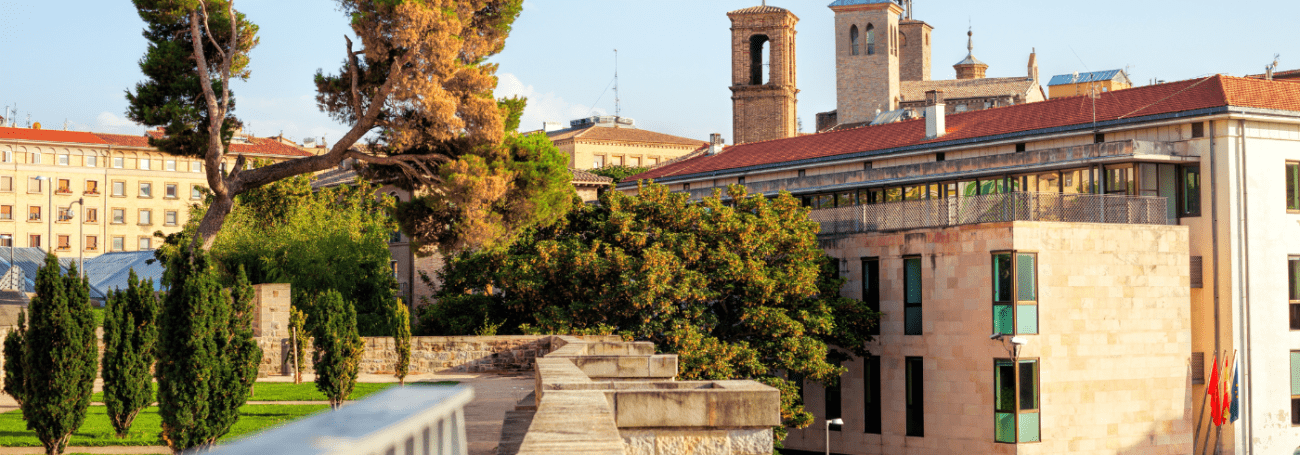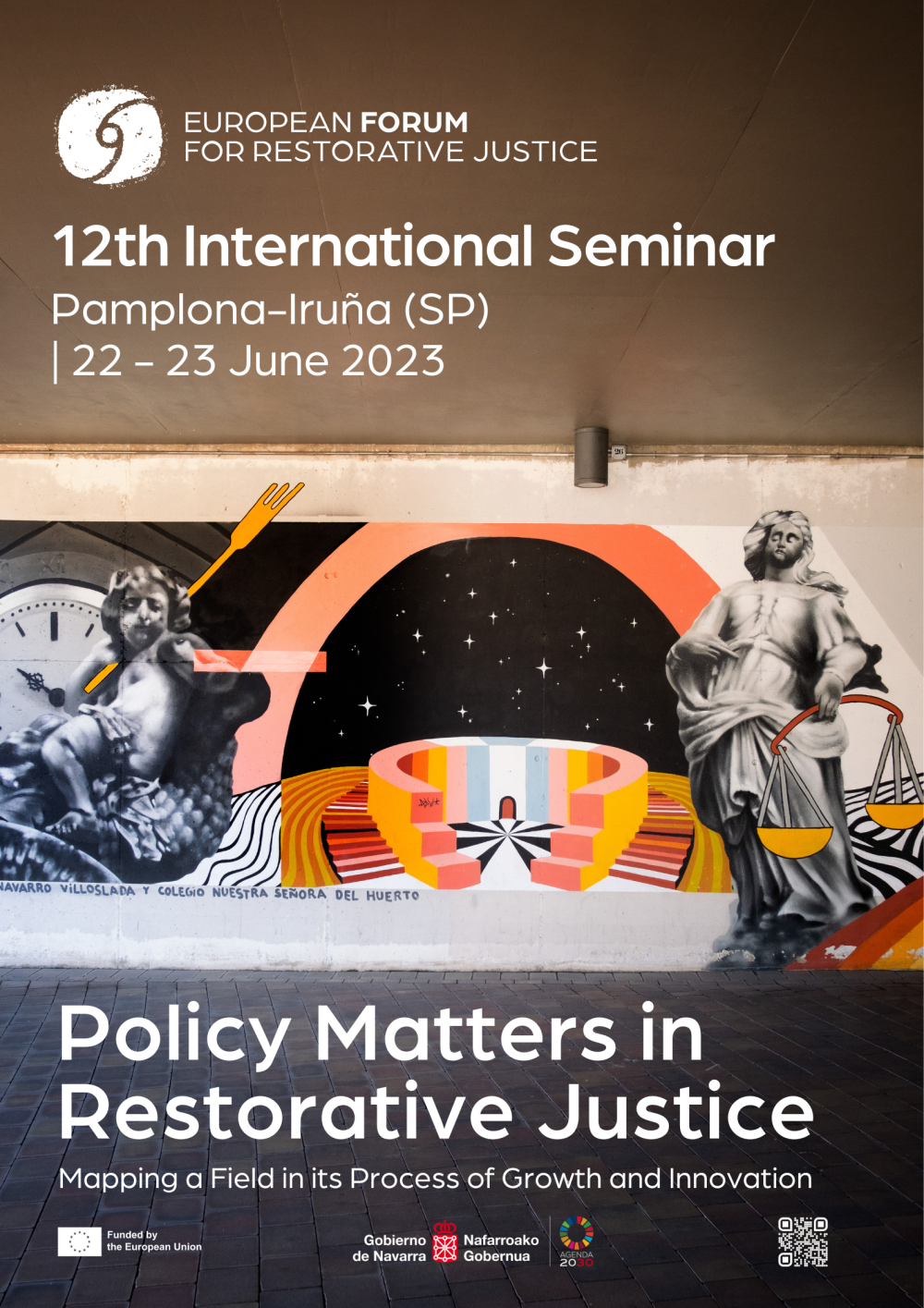

10 good reasons to attend the seminar in Pamplona!

To take part in the special plenary sessions
The seminar will include three exciting plenary sessions that will interpret 'restorative justice policy' from a variety of perspectives. The event is meant to address a variety of professionals, not solely those involved in direct policy development:
- A panel is dedicated to the use of restorative justice in cases of serious harm against specific vulnerable groups, such as women victims of violence. Starting from the recent Spanish prohibition to use mediation in gender-based violence and sexual violence (adopted in Autumn 2022), we invited judge Carme Guil (Spain) and Dr. Estelle Zinsstag (UK) to present the potential and challenges of this area of application for restorative justice.
- Another panel brings together two prominent figures working at the policy level in their regions: Annie Devos (Belgium) is the CEO of the Belgian French-speaking General Administration ‘Houses of justice’ and Edoardo Santos (Spain) is the current Minister of Migration Policies and Justice of Navarre. While Belgium has a long history in the field of restorative justice, with a law on mediation since 2005, Navarra is pioneering a bright new law on restorative justice and restorative practices.
- The last panel will focus on some of the key challenges in the field of restorative justice, and propose ideas to move forward. Prof. Ivo Aertsen (Belgium) will present the first encyclopaedia on restorative justice, reflecting on the challenge of data collection and evaluation. Prof. Claudia Mazzucato (Italy) will present on the difficulties for restorative justice to engage in criminal justice, starting from some communication and language obstacles. Judge Anna Carrascosa (Spain) will focus on restorative justice training for the judiciary and other professionals working in the criminal justice field. Finally, journalist Alfredo Casares (Spain) will reflect on the role of media and public awareness raising, disseminating solutions to the problems faced in our societies.To attend the challenging keynote by Diego Galego!
This year, our keynote speaker is an outsider to the restorative justice community: Diego Galego’s expertise is in uncovering the impact of social movements on policy making. He got really enthusiastic to hear about the restorative justice movement and his speech will support us in thinking what actions the restorative justice community can take to influence policy making. Diego Galego, originally from Brazil, holds a PhD in social science from the University of Leuven, Belgium, and public policy from the University of Aveiro, Portugal. After the plenary, he will take part in one of the parallel workshop sessions for a more intimate talk on his presentation.
To join the thought-provoking workshops
EFRJ events are always the occasions to make your voice heard! While our Scientific Committee identified the main themes to be addressed in the plenaries, a call for proposals was launched to ask all our participants to contribute to the programme with presentations and panel discussions. By the original deadline (20 March) we received more than 50 abstracts dedicated to relevant topics such as interagency cooperation, data collection and evaluation, public awareness raising and social impact, training and practice developments, financial challenges and fundraising in different areas of application of restorative justice (prisons, schools, communities, large scale conflicts as well as with specific crimes and vulnerable groups such as child abuse, women victims of violence, LGBTQ+ hate crime). The extended call is open until 20 April: your abstract will be included in the waiting list in case of cancellations (as the programme is already complete).
To learn the context of Navarra's new pioneering law on restorative justice
The Parliament of Navarra adopted a new on law on restorative justice on the 2nd of March 2023. Its key points include a universal right of access to restorative justice services, except in crimes of gender violence, as well as a referral to the Restorative Justice Service at any stage of the criminal process, and the creation of a Restorative Practices Network, financed with subsidies from the Government of Navarra. In order to guarantee the quality and training of the facilitator teams, there will be a Quality Plan, to be reviewed every 2 years. The seminar will be an excellent opportunity to learn from the experiences of the initiators of this law, our hosts at the event (the Government of Navarra), and to discuss the implications of the law.
Because you can choose to follow in Spanish or in English
Attendees of the plenary sessions will benefit from simultaneous interpretation between English and Spanish. Most workshops will be in English, but some will be in Spanish, making sure that during the parallel workshops everyone is welcomed to contribute. This is a great opportunity for everyone to engage in their preferred language. The interpretation service, and much more, is offered by the Penal Enforcement and Restorative Justice Service of the Government of Navarra, our local host and financial supporter of this event.
To support local the social engagement of our hosts at Civican & Geltoki
EFRJ events are well-known for creating the occasion to explore some local realities, in line with the values we promote with restorative justice. For this reason, the policy seminar in Pamplona will be hosted in the local cultural centre CIVICAN. As mentioned in its mission statement, this is “a living space for intergenerational and multidisciplinary meetings” promoting “solidarity and social action, thought and philosophy, with strong awareness of sustainability, and guarantor of the active participation of citizens.” No need to explain further why we chose CIVICAN to host us in Pamplona! Also the social dinner will take place in a special place for Pamplona citizens. Geltoki is a participatory, open and non-profit project promoted by 50 social organisations and managed by a cooperative. Its restaurant is located in the old Pamplona bus station, a beautiful way to give a second chance to old buildings. Its mission to promote solidarity and a sustainable future for all is something we definitely wish to support.
To get more involved in the work of the EFRJ's working groups and committees!
At the seminar in Pamplona you will have the chance to meet the Chairs and other representatives of our 4 Committees and 6 Working Groups. They will be there already on Wednesday for an internal meeting dedicated to motivate and inspire connections between the work of each group and the overall main objectives and activities of the EFRJ. Almost 100 EFRJ members are currently involved in our 10 Committees/ Working Groups, coordinated by engaged Chairs and still sometimes their valuable work remains invisible to the wider restorative justice community and disconnected from other working areas. This internal meeting is then the opportunity to get to know each other and find synergies to better cooperate in the coming two years.
To stay for the Restorative Trainers' Retreat!
This year the EFRJ organises a new type of event in a very special setting: a retreat for trainers, prepared and facilitated by the trainers themselves to learn from each others good practices and best techniques in facilitating restorative learning. It will organised in the magnificent nature of the Pyrenees, in Roncesvalles, a stop for pilgrims of the Camino. The Retreat starts right after the Seminar (24-27 June), and the venue is in the proximity of Pamplona, so it is a great occasion to attend both events!
To stay for extended holiday and enjoy San Fermín!
For those planning their holidays immediately after the seminar, Pamplona will host its famous "running of the bulls" during the the San Fermín Festival (6-14 July), which a vivid and long standing local tradition.
And to be among the first ones to get to know the dates and location of the upcoming EFRJ conference!
We have a location of our next (12th) international conference! After Sassari 2022, Tirana 2028, Leiden 2016, Belfast 2014 and many other cities we visited in the past 23 years since the start of the EFRJ… where will we take you in June 2024?! This will be announced during the closing session of the seminar in Pamplona. One tiny tip to make you dream of it: the EFRJ had never organised an event in that country before and it has a committed local team of EFRJ members who are already busy with being our super-hosts in 2024! Be among the first ones to get to know the place!
Published on 3 April 2023.

